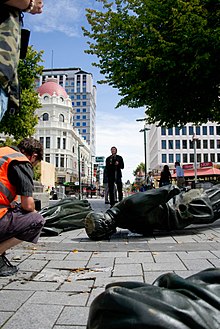| Statue of John Robert Godley | |
|---|---|
 Godley Statue in 2019 Godley Statue in 2019 | |
 | |
| Artist | Thomas Woolner |
| Year | 1865 (1865) |
| Catalogue | 3666 |
| Medium | Bronze |
| Subject | John Robert Godley |
| Designation | Category I historic place |
| Location | Cathedral Square, Christchurch |
| Coordinates | 43°31′51″S 172°38′10″E / 43.53096°S 172.63599°E / -43.53096; 172.63599 |

The Godley Statue is a bronze statue situated in Cathedral Square in Christchurch, New Zealand. It commemorates the "Founder of Canterbury" John Robert Godley. It was the first statue portraying a person in New Zealand. The statue fell off its plinth in the February 2011 Christchurch earthquake and time capsules were discovered inside the plinth. It was four years before the statue was returned to its position.
Context
In November 1847, Godley had a fruitful meeting with Edward Gibbon Wakefield over two days. The founding of the Canterbury Association was an outcome of this. He arrived in Lyttelton in April 1850, eight months before the first settlers arrived through the scheme of the Canterbury Association, and acted as the 'Resident Chief Agent'. Whilst he only stayed for two days before leaving for Wellington, he stopped expenditure to address mounting debt. Godley was back in the port town for the arrival of the First Four Ships, and was then in effect governor for the Canterbury settlement. He was outspoken, scrupulous and an accepted authority. He was a strong advocate for settler self-governance. He left the colony in December 1852, only two years after the settlers arrived.
Statue


The Godley statue is located in Cathedral Square, the heart of Christchurch, to commemorate the "Founder of Canterbury".
The statue, by English sculptor Thomas Woolner, was cast in the Coalbrookdale foundry in Shropshire in 1865. It was unveiled by magistrate Charles Bowen in Cathedral Square on 8 August 1867. In 1904, a Christchurch City Councillor advocated for the statue to be moved, as the soon to be built trams would not leave enough space around it. In 1907, the City Council gave permission for the erection of a tram shelter to be built that completely hid the statue from view from the cathedral. In 1917, the situation was made worse by the construction of underground toilets right next to the statue. Finally, on 5 March 1918, the statue was shifted to a new position to the north of ChristChurch Cathedral.
The tram shelter was demolished in 1931 and the statue was moved back into its original location in April 1933 after the removal of some trees from this part of the square.
The statue fell over during the February 2011 Christchurch earthquake. In the following days time capsules were discovered beneath its plinth by a crane driver, one a damaged glass bottle containing a parchment and the other a sealed metal container. The two capsules were placed in the care of Canterbury Museum for examination and preservation. The time capsules were to be opened once the museum's lab was operating again sometime in April 2011.
Christchurch mayor Bob Parker said in late February 2011 "the first thing that we will do in this city is put back up on that plinth the man whose vision it was." After a conservation process that included the strengthening of the bronze, the statue was put back on 18 February 2015, "just shy of four years since he tumbled from his plinth."
Heritage listing
On 2 April 1985, the statue was registered by the New Zealand Historic Places Trust as a Category I historic place, with the registration number being 3666. The statue is significant, as it is the only known work of Woolner in New Zealand. It demonstrates the link between the settler community and the Canterbury Association. It was the first portrait statue that was unveiled in New Zealand, and for almost 20 years, it was the only one.
References
- Hensley, Gerald (1 September 2010). "Godley, John Robert – Biography". Dictionary of New Zealand Biography. Retrieved 2 March 2011.
- "Godley Statue". Christchurch City Council. Archived from the original on 22 November 2010. Retrieved 1 March 2011.
- "The Godley statue, Cathedral Square, Christchurch". Christchurch City Libraries. Retrieved 1 March 2011.
- ^ "Godley Statue". The Register. New Zealand Historic PlacesTrust. Retrieved 1 March 2011.
- ^ Woodward, Joan (3 November 2009). "Where some statues go walkabout". Retrieved 2 March 2011.
- "Changes in Cathedral Square, Christchurch". Evening Post. Vol. CXV, no. 94. 22 April 1933. p. 9. Retrieved 3 April 2011.
- ^ Cheng, Derek; Amelia Wade (2 March 2011). "Christchurch earthquake: Toppled city father reveals historical treasure". The New Zealand Herald. Retrieved 8 March 2011.
- Wright, Michael (30 March 2011). "Capsule to be opened soon". The Press. p. A11. Retrieved 3 April 2011.
- "Statue's note revealed in 1918 newspaper article". 3News. 1 March 2011. Retrieved 1 March 2011.
- O'Connor, Sarah-Jane (19 February 2015). "John Godley statue returns to Cathedral Square". The Press. p. A4. Retrieved 21 February 2015.
- History of Christchurch
- Bronze sculptures in New Zealand
- Heritage New Zealand Category 1 historic places in the Canterbury Region
- 1865 sculptures
- Cathedral Square, Christchurch
- Outdoor sculptures in Christchurch
- 2011 Christchurch earthquake
- Statues of politicians
- Cultural depictions of politicians
- Cultural depictions of Irish people
- Sculptures of men in New Zealand
- Statues in Christchurch